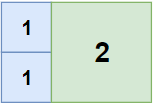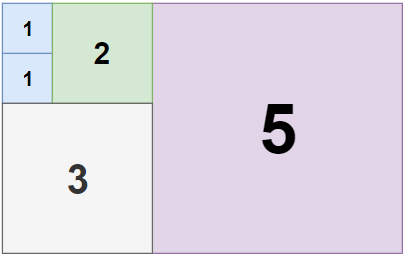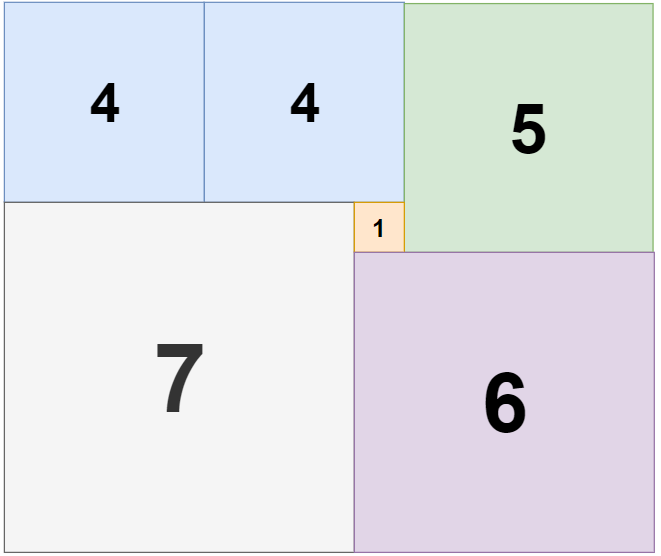Welcome to Subscribe On Youtube
1240. Tiling a Rectangle with the Fewest Squares
Description
Given a rectangle of size n x m, return the minimum number of integer-sided squares that tile the rectangle.
Example 1:

Input: n = 2, m = 3 Output: 3 Explanation:3squares are necessary to cover the rectangle.2(squares of1x1)1(square of2x2)
Example 2:

Input: n = 5, m = 8 Output: 5
Example 3:

Input: n = 11, m = 13 Output: 6
Constraints:
1 <= n, m <= 13
Solutions
Solution 1: Recursive Backtracking + State Compression
We can perform recursive backtracking by position, during which we use a variable $t$ to record the current number of tiles used.
- If $j = m$, i.e., the $i$-th row has been completely filled, then we recurse to the next row, i.e., $(i + 1, 0)$.
- If $i = n$, it means that all positions have been filled, we update the answer and return.
- If the current position $(i, j)$ has been filled, then directly recurse to the next position $(i, j + 1)$.
- Otherwise, we enumerate the maximum square side length $w$ that the current position $(i, j)$ can fill, and fill all positions from $(i, j)$ to $(i + w - 1, j + w - 1)$, then recurse to the next position $(i, j + w)$. When backtracking, we need to clear all positions from $(i, j)$ to $(i + w - 1, j + w - 1)$.
Since each position only has two states: filled or not filled, we can use an integer to represent the current state. We use an integer array $filled$ of length $n$, where $filled[i]$ represents the state of the $i$-th row. If the $j$-th bit of $filled[i]$ is $1$, it means that the $i$-th row and the $j$-th column have been filled, otherwise it means not filled.
-
class Solution { private int n; private int m; private int[] filled; private int ans; public int tilingRectangle(int n, int m) { this.n = n; this.m = m; ans = n * m; filled = new int[n]; dfs(0, 0, 0); return ans; } private void dfs(int i, int j, int t) { if (j == m) { ++i; j = 0; } if (i == n) { ans = t; return; } if ((filled[i] >> j & 1) == 1) { dfs(i, j + 1, t); } else if (t + 1 < ans) { int r = 0, c = 0; for (int k = i; k < n; ++k) { if ((filled[k] >> j & 1) == 1) { break; } ++r; } for (int k = j; k < m; ++k) { if ((filled[i] >> k & 1) == 1) { break; } ++c; } int mx = Math.min(r, c); for (int w = 1; w <= mx; ++w) { for (int k = 0; k < w; ++k) { filled[i + w - 1] |= 1 << (j + k); filled[i + k] |= 1 << (j + w - 1); } dfs(i, j + w, t + 1); } for (int x = i; x < i + mx; ++x) { for (int y = j; y < j + mx; ++y) { filled[x] ^= 1 << y; } } } } } -
class Solution { public: int tilingRectangle(int n, int m) { memset(filled, 0, sizeof(filled)); this->n = n; this->m = m; ans = n * m; dfs(0, 0, 0); return ans; } private: int filled[13]; int n, m; int ans; void dfs(int i, int j, int t) { if (j == m) { ++i; j = 0; } if (i == n) { ans = t; return; } if (filled[i] >> j & 1) { dfs(i, j + 1, t); } else if (t + 1 < ans) { int r = 0, c = 0; for (int k = i; k < n; ++k) { if (filled[k] >> j & 1) { break; } ++r; } for (int k = j; k < m; ++k) { if (filled[i] >> k & 1) { break; } ++c; } int mx = min(r, c); for (int w = 1; w <= mx; ++w) { for (int k = 0; k < w; ++k) { filled[i + w - 1] |= 1 << (j + k); filled[i + k] |= 1 << (j + w - 1); } dfs(i, j + w, t + 1); } for (int x = i; x < i + mx; ++x) { for (int y = j; y < j + mx; ++y) { filled[x] ^= 1 << y; } } } } }; -
class Solution: def tilingRectangle(self, n: int, m: int) -> int: def dfs(i: int, j: int, t: int): nonlocal ans if j == m: i += 1 j = 0 if i == n: ans = t return if filled[i] >> j & 1: dfs(i, j + 1, t) elif t + 1 < ans: r = c = 0 for k in range(i, n): if filled[k] >> j & 1: break r += 1 for k in range(j, m): if filled[i] >> k & 1: break c += 1 mx = r if r < c else c for w in range(1, mx + 1): for k in range(w): filled[i + w - 1] |= 1 << (j + k) filled[i + k] |= 1 << (j + w - 1) dfs(i, j + w, t + 1) for x in range(i, i + mx): for y in range(j, j + mx): filled[x] ^= 1 << y ans = n * m filled = [0] * n dfs(0, 0, 0) return ans -
func tilingRectangle(n int, m int) int { ans := n * m filled := make([]int, n) var dfs func(i, j, t int) dfs = func(i, j, t int) { if j == m { i++ j = 0 } if i == n { ans = t return } if filled[i]>>j&1 == 1 { dfs(i, j+1, t) } else if t+1 < ans { var r, c int for k := i; k < n; k++ { if filled[k]>>j&1 == 1 { break } r++ } for k := j; k < m; k++ { if filled[i]>>k&1 == 1 { break } c++ } mx := min(r, c) for w := 1; w <= mx; w++ { for k := 0; k < w; k++ { filled[i+w-1] |= 1 << (j + k) filled[i+k] |= 1 << (j + w - 1) } dfs(i, j+w, t+1) } for x := i; x < i+mx; x++ { for y := j; y < j+mx; y++ { filled[x] ^= 1 << y } } } } dfs(0, 0, 0) return ans } -
function tilingRectangle(n: number, m: number): number { let ans = n * m; const filled: number[] = new Array(n).fill(0); const dfs = (i: number, j: number, t: number) => { if (j === m) { ++i; j = 0; } if (i === n) { ans = t; return; } if ((filled[i] >> j) & 1) { dfs(i, j + 1, t); } else if (t + 1 < ans) { let [r, c] = [0, 0]; for (let k = i; k < n; ++k) { if ((filled[k] >> j) & 1) { break; } ++r; } for (let k = j; k < m; ++k) { if ((filled[i] >> k) & 1) { break; } ++c; } const mx = Math.min(r, c); for (let w = 1; w <= mx; ++w) { for (let k = 0; k < w; ++k) { filled[i + w - 1] |= 1 << (j + k); filled[i + k] |= 1 << (j + w - 1); } dfs(i, j + w, t + 1); } for (let x = i; x < i + mx; ++x) { for (let y = j; y < j + mx; ++y) { filled[x] ^= 1 << y; } } } }; dfs(0, 0, 0); return ans; }